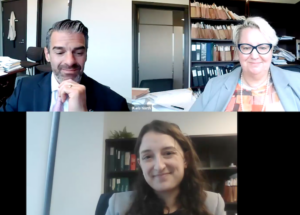Who is a member?
Our members are the local governments of Massachusetts and their elected and appointed leadership.

An MMA webinar with Murphy, Hesse, Toomey & Lehane reviewed essential rules that influence daily operations at the local level: ethics, the public records law, and the open meeting law. Panelists included (clockwise from top left) Attorneys Peter Mello, Karis North and Madison Harris-Parks.
An MMA webinar today with the municipal law team at Murphy, Hesse, Toomey & Lehane reviewed essential rules that influence daily operations at the local level: ethics, the public records law, and the open meeting law.
Attorney Karis North reviewed key definitions related to the open meeting law, including the difference between public bodies and subcommittees; meetings and deliberations; and general rules of a quorum.
She told attendees they “should not participate in a series of communications with less than a quorum,” though they are not restricted from commenting to the general public via social media. North advised using restraint in social media, however.
Attorney Madison Harris-Parks discussed the basics of the public records law, emphasizing that municipal officials should presume that all records are public.
“Public officials are obligated to maintain their public records and, upon leaving their position, to turn over these records,” she said.
“I recommend keeping personal and professional communications separate,” Harris-Parks said. “You should confine all municipal business to one email [address]. … Once you involve personal accounts, things get messy.”
Attorney Peter Mello discussed the state’s conflict of interest law.
He summed it up by saying, “Public employees have undivided loyalty to their public employer and must act in the public interest, not for private gain.”
Public officials, he said, cannot request or receive anything of “substantial value” in exchange for services. There are significant consequences for violating the law, including hefty fines and potentially being barred from holding public office.
North moderated 30 minutes of questions and answers, addressing inquiries about hybrid meetings, texts as public records, and what constitutes a special municipal employee.
• Municipal Bootcamp: Intro to Open Meeting, Public Records & Ethics Law presentation (533K PDF)